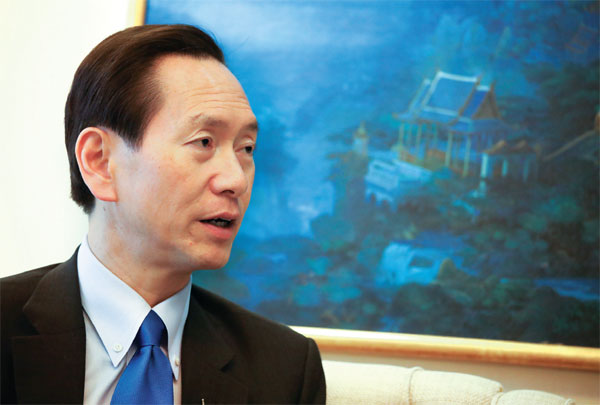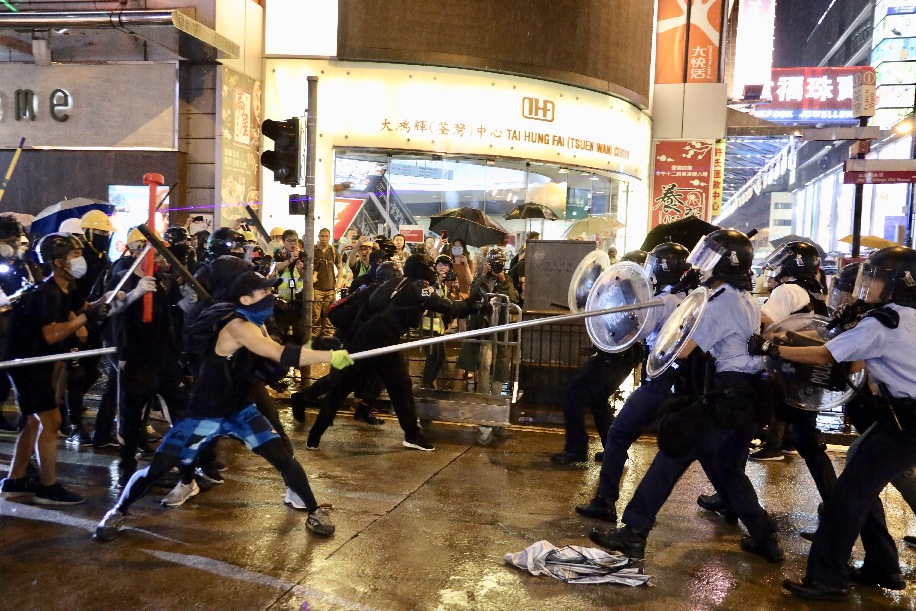Violence 'must end' for dialogue to happen
China Daily Hong Kong | Updated: 2019-09-07 20:44
Executive Council convener praises police performance under pressure during protests
Halting violent, riotous protests is the city's top priority so that law and order in Hong Kong can be restored, Executive Council Convener Bernard Charnwut Chan said.
If the violence is not stopped, then dialogue - not to mention reconciliation - between the government and the protesters cannot happen, Chan told China Daily in an exclusive interview.
Chan, the leader of the Executive Council's non-official members, also said he backs the Hong Kong Police Force, which he said is doing a good job dealing with violence and the never-ending protests and vandalism. Chan praised the officers' calmness and restraint under very difficult situations, while the protesters still chant their "five demands" and urge all of them to be met.
Chief Executive Carrie Lam Cheng Yuet-ngor hopes to talk with the protesters, Chan said. However, he said, that will be difficult because it is not easy to identify them, and nobody can promise violent protests will stop if they make peace with the government because the protesters claim they have no leaders.
"The government has in fact responded to their demands, contrary to their claim that the government has not made any response," Chan said. "It is only that they are not satisfied with the government's answers."
For instance, he said, Lam has repeatedly said the extradition-law amendment bill, which sparked the protests, is dead, as the entire legislative process has stopped.
As to the demand for an independent commission of inquiry, the government has reiterated time and again that the Independent Police Complaints Council as the existing, established mechanism should handle the inquiry. He also noted that council Chairman Anthony Neoh has agreed to expand the scope of investigation by including events that happened after July 2.
Chan said he agrees with Lam that the demand to release and not prosecute the arrested suspects in the protests is against the spirit of the rule of law. He added that public prosecutions are within the portfolio of the secretary for justice in accordance with Article 63 of the Basic Law.
Preconditions hinder talks

"I have privately talked to the protesters and realized there is a small batch of around 2,000 violent, radical ones. I told them it is very dangerous to chant 'Liberate Hong Kong, revolution of our times,' but they claimed those were merely slogans and denied advocating Hong Kong independence.
"There are a very large number of nonviolent people, who maintain they are not addicted to Hong Kong independence but they are unsatisfied with the government," he said.
"The central authorities are worried that some Hong Kong people are being exploited to challenge the country's sovereignty and 'one country, two systems'. The nonviolent people should consider carefully that it is time to disconnect from the violent ones. Though they are not happy with the government, they should not support the unlawful, violent protesters."
Chan also said that while Lam is willing to meet the protesters in public, some protesters, including both students and working adults in their 20s, are unwilling to do so because they fear they would be attacked if their identities were exposed. But he doesn't know if Lam wants the protesters to remove their masks and give their real names at the meeting.
Asked if he would suggest to Lam that she explain at a news conference or in a statement why the "five demands" cannot be entertained, Chan said it will be better to explain that during her meeting with the protesters.
"The protesters should not have any prerequisites, or else the dialogue cannot start. If they have five demands today, how many will they have tomorrow? It is better to have a meeting first and let Mrs Lam explain and narrow the differences. Some young people really want the government to listen to them," Chan said.
On Emergency Regulations

Some people are suggesting the government make law during emergencies or when the public is endangered, under the Emergency Regulations Ordinance. Under the law, the government can, among other things, make laws to censor communications, appropriate property, and enact or suspend any law for an unlimited period of time without approval of the Legislative Council. On Tuesday, Lam neither confirmed nor denied the government would do that. Some pro-establishment figures support the move, but the opposition camp is strongly opposed.
"The chief executive has not said the government would do that," Chan said. "The 'pan-democrats' who said the government would resort to such extreme measures are simply causing panic and inciting more people to take to the street, just as they demonized the fugitive extradition bill. What they said is irresponsible, and their motives are malicious.
"Although the law is there, how will the government resort to such measures that would harm Hong Kong as a financial center? But as CE, Mrs Lam has the duty to consider every possible, legal method to return things to proper order," he explained.
























